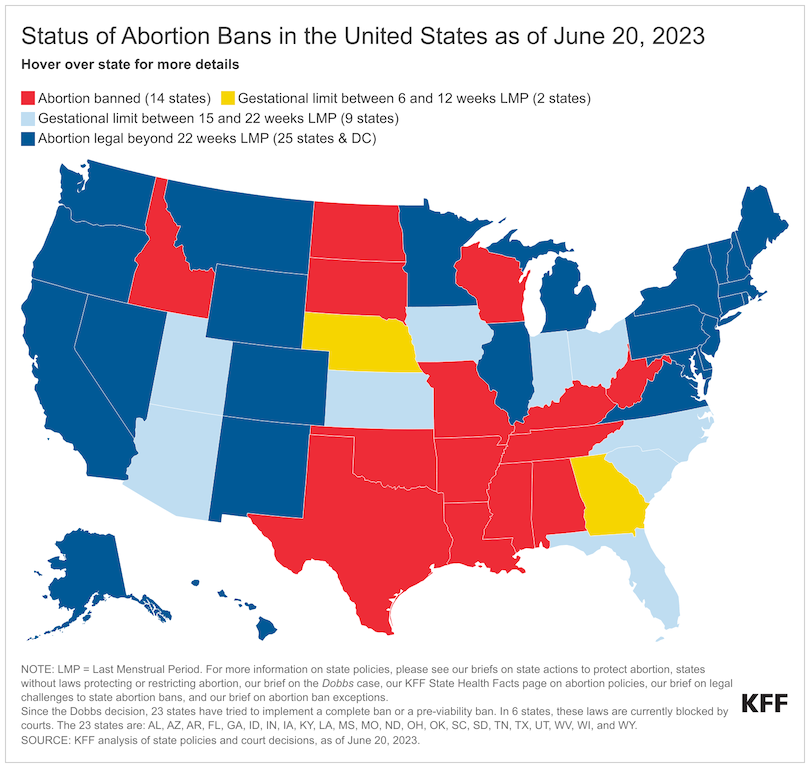Atlanta groups that support access to abortion are marking this weekend’s one-year anniversary of the United States Supreme Court decision that overturned Roe v. Wade, the ruling that ended abortion protections and opened the door to states enacting restrictions, including in Georgia.
Georgia’s House Bill 481 took effect last July, banning abortions after roughly six weeks of pregnancy before many women know they are pregnant. The gestational cutoff also means Georgia clinics that provide the procedure or medication abortion have turned away more patients than ever over the last year.
A new report from the Society of Family Planning, an advocacy group that supports access to abortion, compared the number of abortions in the U.S. in the months after Roe fell to the period before.
The data show more than 23,000 Georgians have so far been unable to access abortion in the state.
Vivienne Kerley-de la Cruz, an organizer with Planned Parenthood Southeast, said Georgians who miss the six-week cutoff are forced to travel out of state to seek abortions in states that are more available.
“Women and girls in states like Georgia and across the South have been forced to choose between fleeing their home state for medical care and carrying out pregnancies that are medically risky, or that they are not emotionally or financially prepared for, or even that they simply do not want,” she said.
“Doctors are being forced to withhold critical lifesaving care out of fear of losing their medical licenses.”
Supporters of H.B. 481 push back against the allegations that doctors are unable to provide lifesaving care to pregnant patients. The law provides exceptions for miscarriage and other dangerous complications.
But Johns Creek Democratic state Rep. Michelle Au, who is also a physician, said the law’s exceptions are vaguely written, putting clinicians and patients at potential risk.
“The decision has unequivocally made women less safe. They’re less safe because of treatments being delayed or denied. And this results predictably in worse outcomes. They’re less safe because when we cannot provide them the medications or the treatments that experts considered to be best practices or meeting medical standards, we are forced to offer our patients substandard care,” Au said.
H.B. 481 had originally passed in 2019, but was previously blocked on constitutional grounds. When the U.S. Supreme Court overturned Roe, state officials asked a court to allow the six-week ban to take effect, and it quickly became one of the most restrictive laws in the country.
Last year, a coalition of Georgia OB-GYNs, clinics that provide abortion and abortion-rights groups sued to block the law.
The plaintiffs represented by the ACLU argue the ban interferes with the doctor-patient relationship and doctors’ ability to treat their patients, which violates patient privacy rights and puts pregnant patients in danger.
“We continue to have to turn away numerous patients every day who are in life-threatening and life-changing situations. Our staff continue to work under the constraints of this law and try to provide as much compassionate care for the people who are coming into our center,” said Kwajelyn Jackson, Executive Director at Feminist Women’s Health Center, a plaintiff in the lawsuit against the ban.
Plaintiffs also argue that, under the state Constitution, H.B. 481 cannot remain in effect because the law was created when Roe was still in place.
The question of whether the ban should be considered void from inception is in the hands of the Georgia Supreme Court, which heard oral arguments in the lawsuit earlier this spring.
That’s where state Solicitor General Stephen Petrany argued H.B. 481 is valid now that Roe’s nearly 50 years of abortion rights no longer stand in the way of individual state bans.
“The Supreme Court today have recognized that when a decision is overruled, it’s not a declaration from this court or the U.S. Supreme Court that the underlying Constitution has changed. It is a declaration that the court was wrong. And it’s and it’s correcting that mistake,” he argued.
The state Supreme Court has until November to rule in the lawsuit, but it’s expected to issue a decision as early as this summer.









